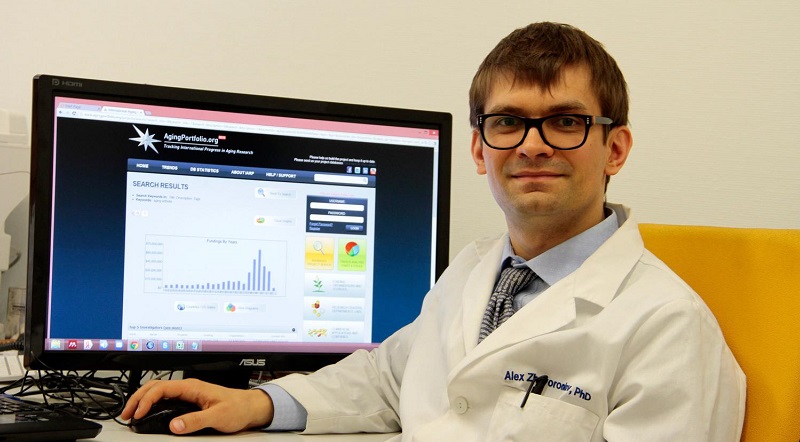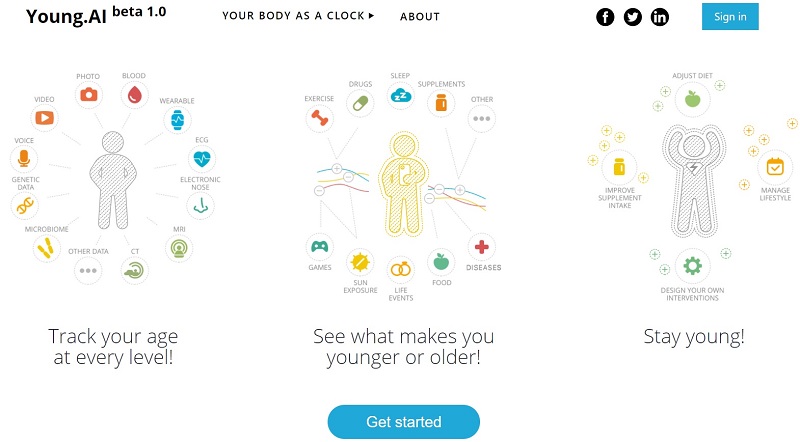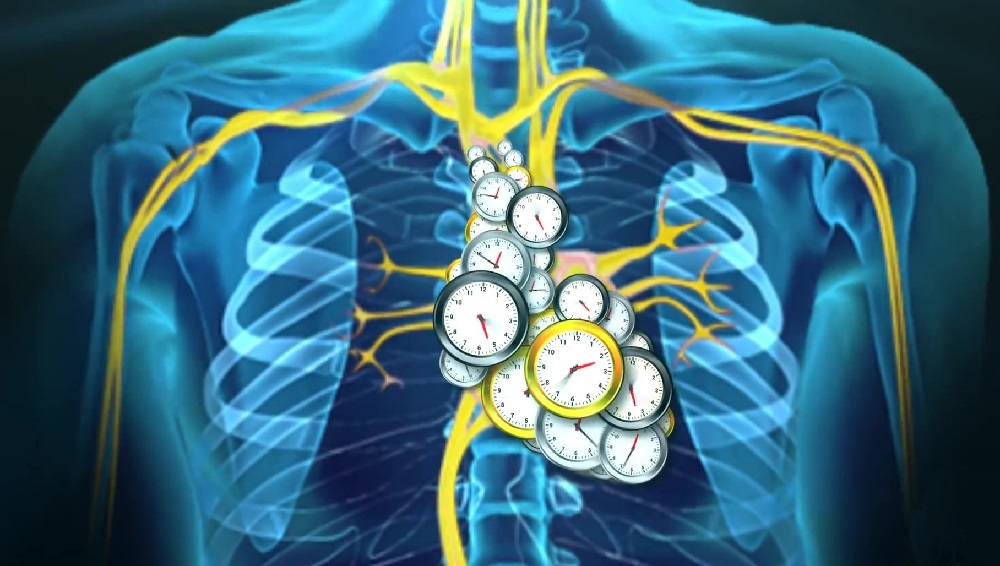New AI-based Tool to Track and Rewind Our Body’s Aging Clock
Summary: Company develops an accurate AI-based ‘Aging Clock’ that tells our biological age for free on its website, and helps us to rewind our individual clock. [This article has been updated and first appeared on the LongevityFacts website under the title ‘New AI-based app measures our body’s aging clock and helps us to rewind it.’ Author: Brady Hartman. ]
Every single one of us has an aging clock, and new AI-based technology promises to accurately measure our own biological age and help us to rewind our clock.
Using Artificial Intelligence (AI), a startup called Insilico Medicine has developed a system that measures your biological age using readings found in a common blood test. Insilico Medicine calls it the Aging Clock, and it is based on biomarkers of aging found in our blood chemistry.
What’s more, the company’s consumer website provides free and rapid information about a visitor’s biological age. As you’ll read later on, the process requires inputting the specific results of a recent blood test.

Alex Zhavoronkov, Ph.D. is the CEO and founder of Insilico Medicine. Zhavoronkov started his career in computer science before switching to the longevity field in 2004. In a recent interview, Zhavoronkov tells Forbes magazine,
“Our test gives people a sober look at how fast or slow their biological clock is ticking,”adding “And for those who learn that their bodies are aging at a fast, unhealthy rate, the test will hopefully serve as a wakeup call, convincing them to take steps now that will add years to their life later—all this insight from a blood test.”
Insilico Medicine says its number-crunching has yielded the most precise measure of a person’s biological age. To develop their algorithm, the company used AI techniques to analyze the blood tests of an international group of 130,000 people.
Our calendar age is not the most accurate predictor of how long we can expect to live and can be off as much as three decades. As Zhavoronkov tells Forbes,
“A far more accurate predictor is our biological age, which measures how quickly the cells in our body will deteriorate compared with the general population,” adding. “Depending on the genetics we inherit and the lifestyle choices we make regarding diet, exercise, weight, stress and habits like smoking or drinking, our biological age can vary as much as 30 years compared with our chronological age.”
A short youtube video explains the concept of the Aging Clock. Credit: Insilico Medicine.
Insilico Medicine, the brains behind the Aging Clock, is headquartered in a technology hub at the Johns Hopkins University campus in Baltimore, MD. The company is a pioneer in applying artificial intelligence to the development of aging clocks and drug discovery, and contracts with several of the pharmaceutical giants. Insilico has assembled one of the world’s largest repositories of human gene expression profiles and operates several deep learning clusters, exceeding 240 teraflops of computing power.
A Better Mousetrap
Researchers have tried for years to precisely measure our biological age – an aging clock known in the scientific community as a biomarker of aging. An accurate indicator of biological aging would be a boon to scientists developing anti-aging drugs because the only alternative is enormously expensive decades-long studies that measure the actual number of years of life gained by a particular drug. An accurate biomarker of aging could be used as a way to measure the rejuvenating effects of an anti-aging pill over a few years, rather than over the course of a human lifespan. While researchers have invented several of these aging clocks, none of them are accurate enough for anti-aging purposes, which represents a significant problem to the geroscientists developing life extension drugs.
Big Data and AI Team Up
Big data is solving many of medicine’s thorniest problems. For example, researchers in Singapore used big data analysis to significantly boost the treatability of cancer. And despite warnings that AI will take over the world, the emerging computer technology is starting to prove its mettle.
Zhavoronkov said that Insilico Medicine’s big data analysis of blood tests on 130,000 people is the most extensive pool of blood work ever used in a longevity study. Each of these blood samples was analyzed for 21 parameters typically measured in a routine blood test including hemoglobin count, cholesterol levels, albumin levels, inflammation markers, and other chemicals.
By using AI to analyze and compare the blood chemistry, age, ethnicity, and other data from over a hundred thousand people, Insilico scientists created what they say is the first genuinely reliable aging clock for humans. When applied to data from simple blood tests, their algorithm generates a reliable forecast as for how long an individual can expect to live.
The enormous size of the data is an inherent problem in analyzing large data sets such as multiple blood tests from over 100,000 people. Zhavoronkov hit upon the idea of using AI techniques and deep neural networks to integrate and analyze data. This technique allows Insilico to understand what parameters are most important in aging. However, to obtain an accurate aging clock, his team realized that it would require lots of data from tissue samples and blood tests. Building up this data repository took years, and after obtaining a large enough data set, Insilico used deep neural networks to analyze a large number of these aging biomarkers.
Comparing Aging Clocks
The idea of an aging clock is not entirely new. Just this week, researchers announced they found a potential biomarker of aging in urine.
Longevity scientists have developed six types of aging clocks. Based on a variety of tissue measurements, these predictors of biological age include the Horvath epigenetic clock, transcriptomic aging clocks, telomere length clock, frailty indices, and composite biomarker predictors. All of these aging clocks rely on number-crunching using big data techniques to predict human biological age.
A group of Swedish researchers at the Karolinska Institutet analyzed the predictive power of most aging clocks and published their review in the middle of last year. Unfortunately, the Swedish scientists did not include a direct comparison of Insilico’s aging clock in their analysis. However, the team evaluated a composite biomarker developed by Sebastiani and colleagues and blood-based aging clocks. The researchers found that the epigenetic clock was a reliable biomarker of aging. However, composite biomarkers have higher predictive power. Unfortunately, these composite biomarkers haven’t been validated in a sufficient number of studies to be reliable.
The point here is that Insilico may have developed a precise aging clock. However it’s actual value as a measure of biological aging can’t be determined by a single study, especially one conducted by the outfit which invented it. The long-studied epigenetic clock may be less accurate, but hundreds of independent studies have validated its precision.

Accessing the Aging Clock
People can determine their biological age for free by visiting the Young.AI website. Users will be asked to enter data from their latest blood test, including blood glucose, albumin levels and 17 other pieces of information. Also, users will be asked to upload a recent photo of their face, to make the biological aging estimate even more precise. This step is optional, and the photograph is fed in another Insilico AI-driven algorithm that recognizes signs of aging in photos. The report is free and appears within seconds after the user enters their blood work data and a picture. Zhavoronkov told Forbes that users need not worry about the information they upload to Young.AI, saying
“This information is very low value and safe,” adding. “We don’t ask for sensitive, private information. Actually it’s less than what people put on Facebook. We can’t identify a person by the information you put in.”
However, Zhavoronkov encourages subscribers to use a nickname rather than their real name.
Aging Clock Accuracy
Insilico has developed three aging clocks. The base version is an aging clock based on 19 aging biomarkers and users have the option of choosing more accurate aging clocks based on 33 biomarkers or 41 biomarkers. The system provides a way for a user to track their vitamin and mineral supplement usage, diet, as well as other inputs, but it doesn’t seem to do much with the data, other than log it. In other words, at first glance, the system does not seem to provide any scenario analysis tools that show how a healthy diet can affect the aging clock.
On the other hand, the system allows a user to track their personal aging clock over time, and see how changes in their blood tests affect their aging clock. For example, independent studies show that lowering blood glucose levels could add years of life expectancy, especially if a person has prediabetes or full-blown type 2 diabetes.
Bottom Line
It appears at first glance that Insilico has built a better predictor of biological aging. Certainly, they have built a widely-usable aging clock, and you can’t beat the price. An aging clock should be judged not only by how accurately it correlates with chronological age and predicts poor health and death but also by its ease of use, cost and the number of independent studies that validate its precision. We will have to wait for corroborative studies that verify the accuracy of Insilico’s aging clock. Until that time, let’s hope they have built an accurate aging clock, especially one that can be used to power clinical trials of lifespan-extending compounds.
Like this Article?
- Help us spread the word – Please click on any of the social media links on this page to share this article.
- Follow us on social media – Google+ or Reddit.
- Sign up for our email list – We use your email to notify you of new articles. We will not send you spam, and we will not share your email address. You can cancel at any time.
- Tell us what you think – Scroll down to enter your comments below.
References
Cover Photo Credit: Insilico Medicine. Screenshot from Young.AI (adapted).
Robin Seaton Jefferson. “AI Researchers Via Their ‘Aging Clock’ May Have Discovered How To Rewind Our Biological Clocks.” Forbes. Feb 27, 2018.
Jylhävä, Juulia et al. “Biological Age Predictors.” EBioMedicine, July 2017, volume 21, Pages 29–36. Link.
Sebastiani, B. Thyagarajan, F. SUN, N. Schupf, A.B. Newman, M. Montano, T.T. Perls. “Biomarker signatures of aging.” Aging Cell (16(2), 2017, 329–338)
Disclaimer
Diagnosis, Treatment, and Advice: This article is intended for informational and educational purposes only and is not a substitute for qualified, professional medical advice. The opinions and information stated in this article should not be used during any medical emergency or for the diagnosis or treatment of any medical condition. Consult a qualified and licensed physician for the diagnosis and treatment of any and all medical conditions. Experimental treatments carry a much higher risk than FDA-approved ones. Dial 9-1-1, or an equivalent emergency hotline number, for all medical emergencies. As well, consult a licensed, qualified physician before changing your diet, supplement or exercise programs.
Photos, Endorsements, & External Links: This article is not intended to endorse organizations, companies, or their products. Links to external websites, mention or depiction of company names or brands, are intended for illustration only and do not constitute endorsements.

seo paketleri, seo hizmeti, seo satın al
seo paketleri, seo hizmeti, seo satın al
seo paketleri, seo hizmeti, seo satın al